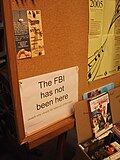Patriot Act
The Uniting and Strengthening America by Providing Appropriate Tools Required to Intercept and Obstruct Terrorism Act of 2001,[1] also known as the USA Patriot Act is an anti-terrorism law. It was proposed by the Bush Administration soon after the September 11 attacks. At that time, President Bush had very high approval ratings and it was clear that most Americans wanted him to do something to stop more terrorism. The bill passed quickly in Congress, mostly before it had even been fully read. The act made it much easier to control money terrorists had in bank accounts. It also made it easier for the government to access people's library and phone records. The act was criticized by many organizations, particularly the American Civil Liberties Union, for being a threat to Americans' civil liberties and rights.[2]
Patriot Act Media
President George W. Bush in October 2001, elucidating the government's rationale behind the USA PATRIOT Act before signing into law
A warrant canary, posted in a Craftsbury, Vermont library in 2005: "The FBI has not been here (watch very closely for removal of this sign)". Announcing the receipt of a national security letter would violate the associated gag order, while removing the sign would not.
References
- ↑ Public Law Pub.L. 107-56
- ↑ Lithwick, Dahlia; Turner, Julia (September 8, 2003). "A Guide to the Patriot Act, Part 1". Jurisprudence (Slate). http://www.slate.com/id/2087984/.
